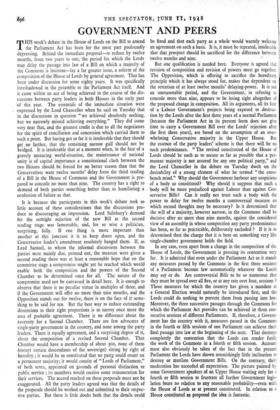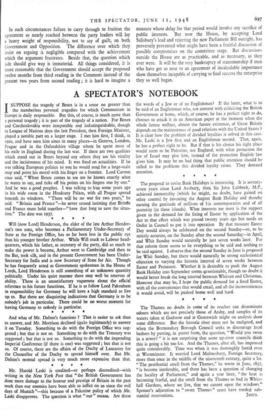GOVERNMENT AND PEERS
THIS week's debate in the House of Lords on the Bill to amend the Parliament Act has been for the most part profoundly depressing. Behind the immediate proposal—to reduce by twelve months, from two years to one, the period for which the Lords may delay the passage into law of a Bill on which a majority of the Commons is insistent—lay a far greater issue, a reform of the composition of the House of Lords by general agreement. That has been under discussion for some eighty years. It was specifically foreshadowed in the preamble to the Parliament Act itself. And it came within an ace of being achieved in the course of the dis- cussions between party leaders in both Houses in the early part of this year. The essentials of the immediate situation were expressed by the Lord Chancellor when he said on Tuesday that in the discussions in question " we achieved absolutely nothing, but we narrowly missed achieving everything." They did come very near that, and the greatest credit is due to all the negotiators for the spirit of conciliation and concession which carried them to such a point. But having got so far it is intolerable that they should get no farther, that the remaining narrow gulf should not be bridged. It is intolerable that at a moment when, in the face of a gravely menacing world-situation, the maintenance of national unity is of capital importance a constitutional clash between the two Houses should be forced for no better reason than that the Conservatives want twelve months' delay from the third reading of a Bill in the House of Commons and the Government is pre- pared to concede no more than nine. The country has a right to demand of both parties something better than so humiliating a confession of failure as that.
It is because the participants in this week's debate took so little account of these considerations that the discussions pro- duce so discouraging an impression. Lord Salisbury's demand for the outright rejection of the new Bill at the second reading stage was lamentable, and, for so wise a politician, surprising, folly. If one thing is more important than another at this juncture it is to keep doors open, and the Conservative leader's amendment resolutely banged them. If, as Lord Samuel, to whom the informal discussions between the parties were mainly due, pointed out, the measure were given a second reading there was at least a reasonable hope that on the committee stage a compromise might yet be reached which would enable both the composition and the powers of the Second Chamber to be determined once for all. The nature of the compromise need not be canvassed in detail here. It is enough to observe that there is no peculiar virtue in multiples of three, and if the Government will offer no more than nine months, and the Opposition stands out for twelve, there is on the face of it some- thing to be said for ten. But the best way to reduce outstanding dissensions to their right proportions is to survey once more the area of probable agreement. There is no difference about the necessity for a Second Chamber. There are few advocates of single-party government in the country, and none among the party leaders. There is equally agreement, and a surprising degree of it, about the composition of a revised Second Chamber. That Chamber would have a membership of about 300, none of them (except certain descendants of the sovereign) sitting by right of heredity ; it would be so constituted that no party could count on a permanent majority; it would consist of " Lords of Parliament," of both sexes, appointed on grounds of personal distinction or public service ; its members would receive some remuneration for their services. The accord reached on these proposals must not be exaggerated. All the party leaders agreed was that the details of the proposals should be worked out and submitted to their respec- tive parties. But there is little doubt both that the details could be fixed and that each party as a whole would warmly welcome an agreement on such a basis. It is, it must be repeated, intolerable that that prospect should be sacrificed for the difference between twelve months and nine.
But one qualification is needed here. Everyone is agreed that revision of composition and revision of powers must go together. The Opposition, which is offering to sacrifice the hereditary principle which it has always stood for, makes that dependent on the retention of at least twelve months' delaying-power. It is not an unreasonable period, and the Government, in refusing to concede more than nine, appears to be losing sight altogether of the proposed change in composition. All its arguments, all its fear of a Labour Government's projects being exposed to destruc- tion by the Lords after the first three years of a normal Parliament (because the Parliament Act in its present form does not give time to carry a Government Bill over the Lords' rejection after the first three years), are based on the assumption of an over- whelming Conservative majority in the Upper House. But the essence of the party leaders' scheme is that there will be no such predominance. " The revised constitution of the House of Lords should be such as to secure as far as possible that a per- manent majority is not assured for any one political party," and the Lord Chancellor in the debate on Tuesday dwelt on the desirability of a strong element of what he termed " the cross- bench mind." Why should the Government harbour any suspicions of a body so constituted? Why should it suppose that such a body will be more prejudiced against Labour than against Con- servative Bills? Can it really. not trust such a body with the power to delay for twelve months a controversial measure on which second thoughts may be necessary? Is it determined that the will of a majority, however narrow, in the Commons shall be decisive after no more than nine months, against the considered view of an assembly in whose composition any party predominance has been, so far as practicable, deliberately excluded ? If it is so determined then the charge that it is bent on something very like single-chamber government holds the field.
In any case, even apart from a change in the composition of the House of Lords, the Government is pressing its contention very far. It is admitted that even under the Parliament Act as it stands any measures passed by the Commons in the first three sessions of a Parliament become law automatically whatever the Lords may say or do. Are controversial Bills to be so numerous that they must be spread over all five, or at any rate over four, sessions ? Those measures for which the country has given a mandate at a General Election would naturally be introduced first, and the Lords could do nothing to prevent them from passing into law. Moreover, the three successive passages through the Commons for which the Parliament Act provides can be achieved irr three con- secutive sessions of different Parliaments. If, therefore, a Govern- ment has the country with it, measures passed in the Commons in the fourth or fifth sessions of one Parliament can achieve their final passage into law at the beginning of the next. That destroys completely the contention that the Lords can render futile the work of the Commons in a fourth or fifth session. Account must also obviously be taken of the fact that in the present Parliament the Lords have shown astonishingly little inclination to destroy or mutilate Government Bills. On the contrary, their moderation has exceeded all expectation. The picture painted by some Government speakers of an Upper House waiting only for a fourth or fifth session to frustrate all further Government legis- lation bears no relation to any reasonable probability—even with the House of Lords as at present constituted. In relation to a House constituted as proposed the idea is fantastic. In such circumstances failure to carry through to fruition the agreement so nearly reached between the party leaders will lay a heavy weight of responsibility, not to say of guilt, on both Government and Opposition. The difference over which they insist on arguing is negligible compared with the achievement which the argument frustrates. Beside that, the question which side should give way is immaterial. All things considered, it is more reasonable that the Government should accept the proposed twelve months from third reading in the Commons instead of the present two years from second reading ; it is hard to imagine a measure whose delay for that period would involve any sacrifice of public interests. But now the House, by accepting Lord Salisbury's lead and rejecting the new Parliament Bill outright, has perversely prevented what might have been a fruitful discussion of possible compromises on the committee stage. But discussions outside the House are as practicable, and as necessary, as they ever were. It will be the very bankruptcy of statesmanship if men who have got so near to an agreement of incalculable importance show themselves incapable of carrying to final success the enterprise they so well began.































 Previous page
Previous page